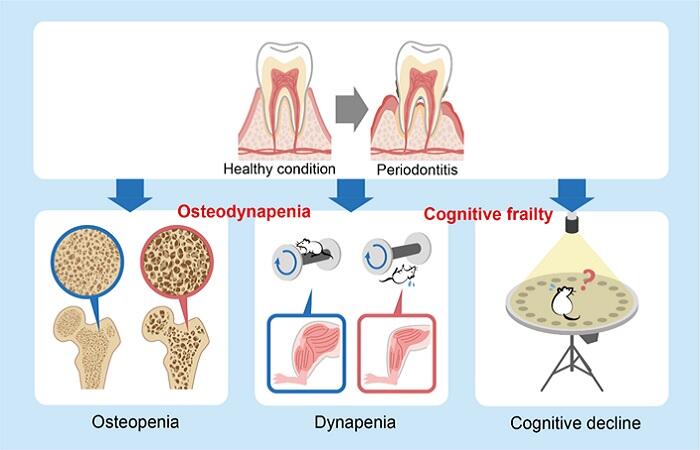A research group led by Senior Assistant Professor Yoshitaka Kase of the International Center for Brain Science at Fujita Health University, Senior Assistant Professor Satoru Morikawa, Professor Taneaki Nakagawa and Professor Hideyuki Okano at Keio University, Professor Kazuyuki Ishihara at Tokyo Dental College and Professor Sumito Ogawa at the University of Tokyo has announced their research findings showing that periodontitis-induced inflammation accelerates aging, resulting in frailty (fragile state) in various organs. Analysis of periodontitis model mice revealed that osteoporosis, in particular, does not recover solely through periodontitis treatment. The findings highlight the importance of comprehensive medical care and periodontal disease care through collaboration between geriatricians and dentists. The results were published in the online edition of the international journal Inflammation and Regeneration on February 3.

Kase, Y., Morikawa, S., Okano, Y. et al. Multi-organ frailty is enhanced by periodontitis-induced inflammaging. Inflamm Regener 45, 3 (2025). https://doi.org/10.1186/s41232-025-00366-5. CC-BY-4.0
The incidence of periodontal disease increases with age, and the presence of periodontal disease is considered to increase the risk for various diseases. Meanwhile, long-term effects of its advanced form called periodontitis on organs such as the brain, bones and muscles have remained unknown.
In this study, the research group constructed and analyzed mouse models contracting mild and severe periodontitis for three and five months, respectively. Single-cell RNA sequencing analysis of gene expression in calf muscles revealed that slow-twitch muscle fibers were specifically impaired. Furthermore, reduction in bone mineral density of the femur was larger than that of any other organ, and the mice showed features of frailty. Periodontitis also caused an increase in hippocampal microglia (immune cells in the brain) and a decrease in adult neurogenesis, leading to impaired spatial learning and dementia.
The research group examined if therapeutic intervention is able to restore the reduced bone mineral density in the femur, which was the most fragile bone, but the intervention failed to restore density. Once bone density decreases, treating periodontitis alone is insufficient, and active treatment for bone health is also necessary. This finding suggests the importance of early intervention for both periodontitis and bone health.
Kase said, "This study started from the clinical question of how cognitive function and various organs are affected in patients with a deteriorated oral environment. The results showed that organs had different levels of vulnerability to chronic inflammation induced by periodontal disease. This research was made possible for the first time by bringing together the strengths of multiple institutions to which I belong. Going forward, we aim to advance research integrating geriatrics and dentistry to uncover the impact on other organs and the nature of inflammatory aging."
Journal Information
Publication: Inflammation and Regeneration
Title: Multi-organ frailty is enhanced by periodontitis-induced inflammaging
DOI: 10.1186/s41232-025-00366-5
This article has been translated by JST with permission from The Science News Ltd. (https://sci-news.co.jp/). Unauthorized reproduction of the article and photographs is prohibited.




